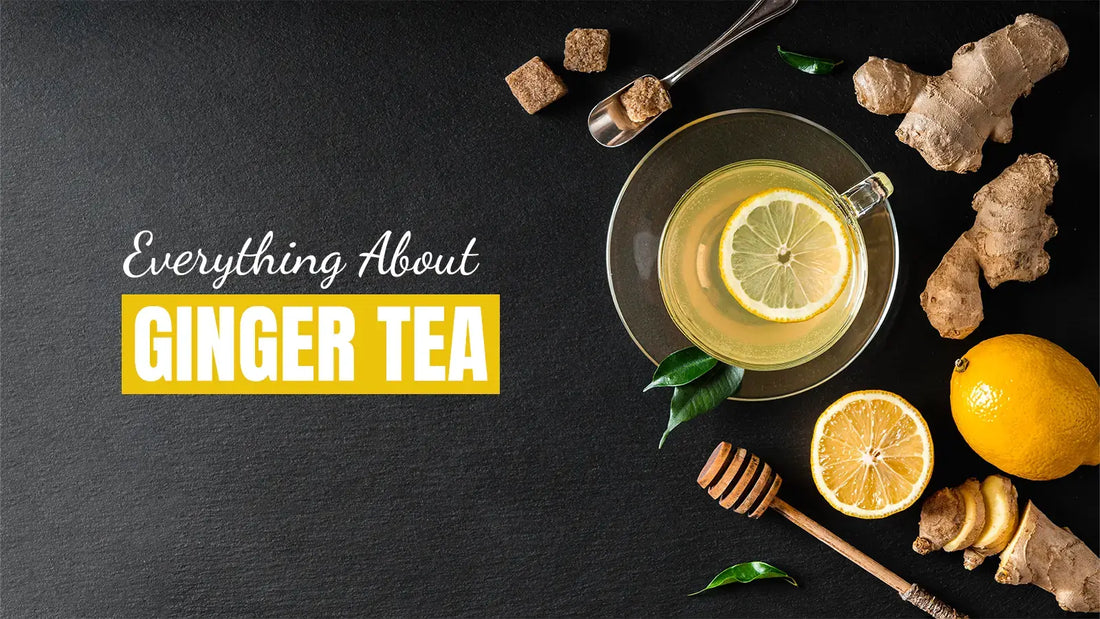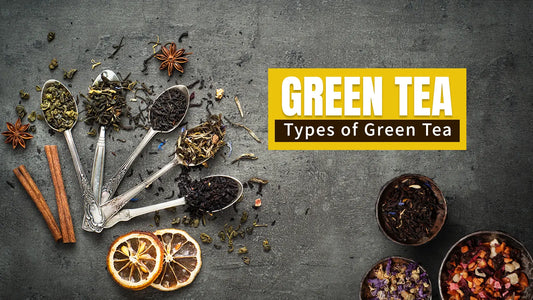Ginger Teas: Everything You Need to Know

Did you know that ginger tea has been consumed for more than 5000 years for its healing properties?
Ginger tea offers a soothing and invigorating experience, usually enjoyed warmly. Whether you’re seeking comfort on a chilly day or a natural remedy to boost your health, ginger tea has something to offer. There’s so much more to discover than you might think, so let's jump right onto it.
What is Ginger Tea?
Ginger tea falls under one of the caffeine-free herbal teas. It is brewed by boiling the fresh root of the ginger plant that is Zingiber Offiicinale. This tea has a very bold flavor with a pungent and a bit peppery taste. When you smell, you’ll get the zesty and spicy-sweet aroma that awakens the senses.

Nutritional Properties of Ginger Tea
Ginger Tea consists of rich vitamins like C and B6. Besides, it also has macronutrients like potassium, magnesium, etc.
As mentioned by the USDA, 100 grams of ginger tea consists of the following nutritional properties.
- Magnesium: 1 mg
- Calcium: 3 mg
- Iron: 0.01 mg
- Potassium: 4 mg
- Phosphorus: 0 mg
- Protein: 0.02 g
- Energy: 1 kcal

How to make ginger tea?
You could simply brew ginger tea in hot water. Or, you may serve ginger tea in many ways like peppermint ginger tea, ginger-honey-lemon tea, lemon ginger and turmeric tea, ginger Lime tea, and many more.
Add up your desired ingredients, explore different recipes, and savor this beverage as you want.
You’ll Need:
- 1 inch of fresh ginger root
- 12 fl oz of water
- 1 teaspoon of honey or lemon juice(optional)
- ⅕ cinnamon stick (optional)
- A pinch of turmeric powder (optional)
- A saucepan
- A tea cup and strainer
Instructions:
- First, rinse the ginger root and peel it. Slice the ginger root into pieces and slightly crush it to extract the stronger flavor.
- Boil 12 fl oz of filtered water in a saucepan.
- Put the ginger into the boiling water and simmer for around 5 to 10 minutes.
- If you want, add in the optional flavors.
- Using a strainer, pour the ginger tea into your cup and enjoy.

Ginger Tea Benefits
May Help with Nausea
Ginger tea’s bioactive compounds like shogaols or gingerols could help to alleviate the nausea. One study explored that ginger may be an effective treatment for vomiting and nausea. However, the study was based on 12 samples only and more research is required to support it.
Could Boost Digestive Health
The anti-inflammatory effect of ginger tea may contribute in soothing the inflammation of the gastrointestinal tract and bloating. It might also help in preventing gas, leading to a smoother digestion. While incorporating ginger tea could be beneficial in improving digestive health, we advise you to consult a professional doctor in case of severe issues.
Might Relieve Cold
Due to ginger tea’s anti-inflammatory, antibacterial, and antiviral properties, it may help to alleviate the cold symptoms and irritations.. A hot cup of ginger tea could offer comfort and warmth, soothing the throat discomfort.
Could Help with Weight Loss
Ginger tea may be effective in boosting the metabolic rate and reducing body fat. It could help to raise the thermogenesis that leads to a higher calorie burn.
May Soothe Pain
In one of the book chapters called “The Amazing and Mighty Ginger,” it’s mentioned that the gingerol compound found in ginger tea possesses an anti-inflammatory effect. This property could be useful in decreasing the swelling and discomfort in muscle soreness. So, ginger tea may be helpful when you’re dealing with aches. However, further research and evidence are needed to back this.
Ginger Tea Side Effects
Even though we’ve discussed the potential benefits of ginger tea, it could have a negative impact too, when consumed excessively. Some possible side effects are:
- Might cause heartburn in gastroesophageal reflux disease people.
- Could lead to gastrointestinal discomfort like bloating or diarrhea.
- May experience abdominal pain when overconsumed.

Ginger Tea FAQs
How to make ginger tea from ginger root?
First, peel, slice, and slightly crush 1 inch of fresh ginger root. Boil the water in a saucepan and add in the ginger. Simmer for around 10 to 15 minutes. Strain and pour the tea into a cup. Serve it as it is or add additional flavors and enjoy!
What is lemon ginger tea good for?
Lemon ginger tea may potentially have numerous health benefits like relieving nausea, supporting weight loss, reducing stress, etc.
Does ginger tea have caffeine?
No, ginger tea does not contain caffeine. But, if you add ginger in black tea, it has caffeine.
Does ginger lemon tea help with stomach pain?
Since ginger lemon tea has anti-inflammatory properties, it could help to ease the stomach pain.

Conclusion
In conclusion, ginger tea is not just a flavorful and comforting beverage! From soothing digestion and easing nausea to boosting immunity and reducing inflammation, the potential benefits of ginger tea are truly remarkable. So why not brew yourself a cup today and experience its many wonders? You might just find that ginger tea becomes your new comforting drink.








